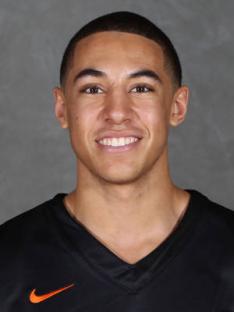This year’s men’s basketball team might be the best team in modern Ivy League history not to win a championship.
That’s not an honor it hoped to achieve, of course. Princeton entered the final regular-season weekend with only one Ivy loss, effectively tied with Yale atop the league. But a heartbreaking 73-71 defeat at Harvard left the Tigers’ fate out of their hands. Though they bounced back to beat Dartmouth the following day, the Bulldogs swept their weekend games to win the solo conference title at 13-1.
In one of the strongest Ivy Leagues ever, the Tigers have outscored conference foes by 11.5 points per game. If they beat Penn at home on Tuesday, they will finish 12-2 in league play, a record that would have won at least a share of the title in four of the last five seasons. According to College Basketball Reference’s Simple Rating System, Princeton has been 7.8 points per game better than the average D-I team this season (adjusted for its schedule) — better than all but nine Ivy teams since 1980, all of them champions.
But one of those nine teams is this year’s Bulldogs, who clinched their first NCAA tournament bid since 1962 on Saturday with an impressive win at third-place Columbia.
“I told the guys, it’s really hard to go 13-1, so kudos to [Yale],” head coach Mitch Henderson ’98 said. “I don’t know what to say. Any other year, that usually gets it done.”
The pivotal game came at Harvard, where Princeton has not won since 2010. This seemed like the year to end that streak: Due to graduations and injuries, the Crimson looked nothing like the teams that won or shared the last five titles. Princeton won the first meeting by 21 points, and Harvard entered with a 4-8 Ivy record.
Harvard’s size gave the smaller Tigers trouble, however. In the first half, the hosts outscored Princeton 26-14 in the paint (thanks largely to star center Zena Edosomwan, who missed the game at Jadwin with an injury), allowing them to take an eight-point lead into the break. But the Tigers scored 11 consecutive points after halftime, setting the stage for a back-and-forth finish.
Devin Cannady ’19 had hit the two biggest shots of Princeton’s season, game-tying baskets at Penn and Columbia that led to overtime victories. He came through again in crunch time Friday, driving for a layup with 35 seconds left to knot the score at 71. But as the clock ticked down, Harvard forward Patrick Steeves dribbled into the paint and drew a foul, making both free throws to retake the lead. (Steeves, a senior who missed three full seasons with injuries, scored a game-high 25 points.)
That left Princeton with seven seconds to respond. Cannady found a cutting Myles Stephens ’19 under the basket, but Stephens’ shot was blocked. Steven Cook ’17 got off a second attempt, but it rolled around the rim and fell off — deciding the Ivy League race by mere inches.
“We lost the game in the first half, when we couldn’t stop anybody,” associate head coach Brian Earl ’99 said. “You get a little more nervous when you’re down that much and you should be up in your mind, and it just sort of snowballed.”
The Tigers still had an outside chance to share the title when they tipped off at Dartmouth, and they did their own part. Princeton jumped out to an early lead behind a flurry of three-pointers and steals, cruising to an 84-65 victory. Cook had 22 points and three steals in the first half alone, including five threes and a two-handed dunk from a backdoor cut.
“We definitely had a little extra fire tonight after a loss like last night,” Cook said. “That kind of wakes you up and definitely gets you going.”
But when the players returned to their phones in the locker room, they saw disappointing news: Yale had led Columbia wire to wire. Twenty minutes after their own victory, Princeton’s championship hopes were officially dashed.
The Tigers are currently projected to get a bid to the NIT. If so, they can take inspiration from perhaps the best ring-less Orange and Black team before them: The 1998-99 Tigers, who lost the Ivy League to Penn, but won two games in the NIT before falling in the quarterfinals.
And nearly all of the current roster will have another chance to reach the NCAA tournament. Every regular returns next season, and forward Hans Brase ’17 is expected to rejoin the team after missing this year with a torn ACL. The Tigers will have the most returning talent in the league, as well as the motivation of an unfulfilled dream.
“This is going to stick with them for a long time, unfortunately,” Henderson said. “But I think you learn a lot more from losing than you learn from winning. That’s the part that hurts.”

